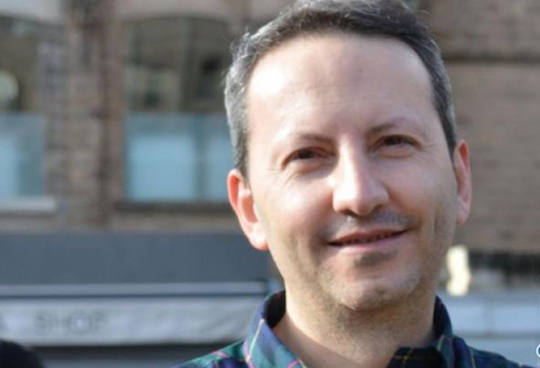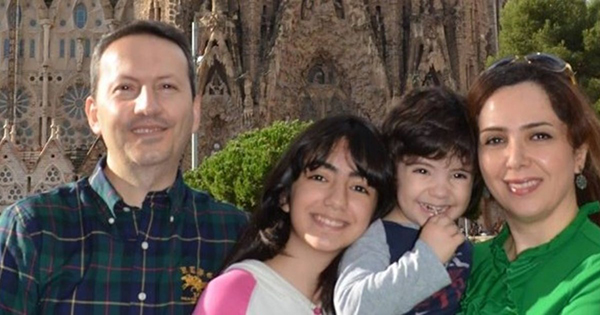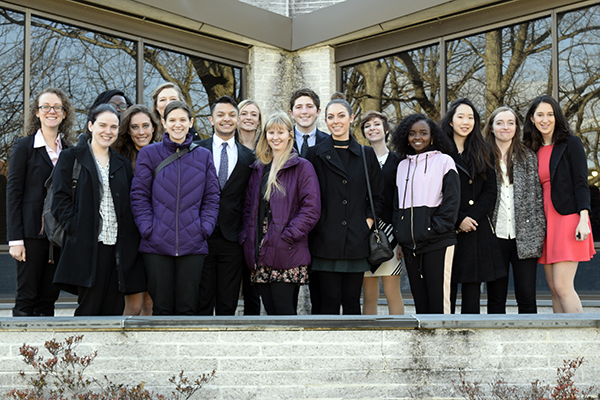Students Advocate for Academic Sentenced to Death
April 20, 2018

BLOOMINGTON, Ill.— Ahmadreza Djalali, a 45-year-old Iranian-born Swedish resident and specialist in disaster medicine, has been imprisoned and sentenced to death by Iranian officials in what Amnesty International called “a grossly unfair trial.” Illinois Wesleyan University first-year students and members of the Advocacy Risk Seminar, Jonathan Panton ’21 and Tatum Zsorey ’21, advocated for Djalali’s release at the second annual Student Advocacy Day in Washington D.C., March 8-9.
Sponsored by the IWU Center on Human Rights and Social Justice, the Advocacy Seminar is affiliated with Scholars at Risk, a non-profit organization that advocates for academics being held in foreign countries. At the beginning of each academic year, Scholars at Risk sends a list of potential scholars who are prisoners of conscience to university organizations who advocate for academics abroad. Although Zsorey said it was difficult to choose one scholar, members of IWU’s Advocacy Seminar ultimately chose to advocate for Djalali, who was arrested in Iran while attending a business trip.
“I became particularly passionate and thankful that I could advocate for Dr. Djalali when I learned of the horrible conditions he has been facing in prison, the unfair justice system that Iran has used to prosecute him and the unjust sentencing he has received,” said Zsorey, an international studies major and environmental studies minor. “After understanding the complex implications of Dr. Djalali’s case, I became more and more ardent about wanting to help him.”
Arrested by Iranian authorities on April 25, 2016, Djalili was denied access to a lawyer for seven months and held in solitary confinement for three months, according to Amnesty International. Although Amnesty said no evidence has ever been presented to show that Djalili is anything other than “an academic peacefully pursuing his profession,” he has been accused of being a spy and threatened with the death penalty. Amnesty said Iran is using Djalali’s work as a doctor in disaster medicine, his studies and teachings in Europe, and his residency to fabricate these claims.

“Our defense on behalf of Dr. Djalali was that he was simply a professor of disaster medicine who is unlawfully incarcerated in Iran. He was convicted of collaborating with Israel, which does not make any sense considering that he does not have any ties to Israel,” said Panton, a business administration major. “We hope that Dr. Djalali is released because he has a wife and two children back home.”
Working together with seminar participant Emma Cottrell '21, Panton and Zsorey compiled a research case file defending Djalali and presented their findings before staff members in the offices of Congressmen Danny Davis and Rodney Davis in Washington D.C. on Advocacy Day.
“I personally had an amazing time in D.C.,” Zsorey said. “There’s a vibrant atmosphere that surrounds the city that made me feel as though the work I was doing was real and actually mattered.”
Zsorey said she and Panton received positive responses in D.C. She said the aids agreed to pass on Djalali’s case file and talk with the Congressmen about possible measures of action that could be taken to support Djalali.
“We are currently working with both offices to draft a joint letter in support of the Swedish government, who has done a lot to help get Dr. Djalali freed,” Zsorey said.
In addition to lobbying their case, Panton and Zsorey, along with 30 students from over eight universities, heard advice on international human rights advocacy work from experts at the State Department and other non-governmental organizations. Panton said these presentations helped students gain a better understanding of advocacy.
“The most important thing that I learned about advocacy is that you need to tie your mission to their interests – give them a reason to support your cause,” Panton said.

“One of the most important things I learned was that being an advocate means being active,” Zsorey said. “You have to actively seek out those who can support you and care about what you’re doing, whether they be members of Congress, NGOs, or other advocacy groups. Advocacy isn’t easy, and nothing magically happens unless you put in the time and effort.”
Zsorey said organizations such as IWU’s Advocacy Seminar have given her the opportunity to be active, as they are “widely applicable beyond the classroom.”
“Even though I am only a first-year student, I feel as though I’ve always been more aware of the injustices plaguing the world more than the typical person my age. However, I always believed that there wasn’t much I could do as a student,” Zsorey said. “The Advocacy Day allowed me to realize that there is so much work one student or one group of students can do in advocating on behalf of others.”
Panton said the real-world experiences he has gained as a member of Advocacy Seminar have allowed him to make a real difference.
“I believe events such as Advocacy Day and clubs such as Advocacy Seminar are important because they spread awareness to issues that would otherwise go unnoticed,” Panton said. “It is incredible to have this real-world experience as a freshman because I am doing whatever I can to protect another human being. The fact of the matter is that Dr. Djalali is a person, and as a person, he deserves all of the inalienable human rights that everyone else deserves.”
By Vi Kakares '20